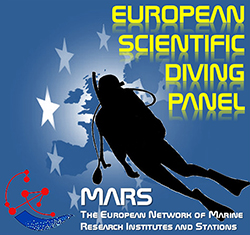– Legal status of scientific diving
Scientific dive is not currently and explicitly regulated by law, however, being work activities, they are subject to different laws concerning work safety and the specific obligations of the profession carried out by the worker. Some categories of professionals are required by law to be enrolled in their professional order (e.g., biologists, geologists, chemists, engineers, physician, etc.). Foreign workers can work as long as they or their employers are qualified to work in Italy, or they are guests of an Italian employer (public or private) who takes responsibility for them (based on signed agreements). All workers undergo occupational safety and health regulations (L. 81/2008). This means that all work activities are subjected to a risk assessment for which the employer is responsible. Although no explicit law applies to scientific dive, employers are called to regulate and supervise the safety of their work activities. In this context, the Higher Institute for Environmental Protection and Research and the Regional Environmental Protection Agencies have published the handbook of Good Practice for the safe conduct of underwater activities, which has been approved by the Ministry of Labour and Social Policies in 2013. This manual forms the basis for the rules applied by many Universities, Research Institutes and other public and private institutions. All these manuals provide that the minimum training of scientific divers is that defined by the European Scientific Diving Panel (ESDP) for European and Advanced European Scientific Divers, with the exception of students and trainees, for whom specific derogations, strict limitations and trainer supervisions are provided.
– Medical examinations
Italian law requires workers to undergo annual health surveillance and the certificate of suitability for the job is issued by the occupational doctor. This also applies to self-employed workers and foreign workers. All Good Practice manuals recommend that the occupational doctor seeks the prior advice of a hyperbaric physician. For more information, please contact the Italian Society of Underwater and Hyperbaric Medicine. A provisional list of Medical Examiner of Divers that may serve as consultants for occupational doctors can be find on the site of the International Diving Medical Expert Board-IDMEB.
– Insurance
All employers must provide insurance coverage to their workers. The “Istituto Nazionale per l’Assicurazione contro gli Infortuni sul Lavoro” (INAIL) is the Italian statutory (and compulsory) insurance against accidents at work and professional diseases. The “Istituto Nazionale della Previdenza Sociale” (INPS) is the main entity of the Italian public retirement system. All waged labourer and most of self-employed, without a proper autonomous social security fund, must be subscribed to INPS.
– Decompression issues
The team leader has the responsibility to choose decompression planning method, based on the (mandatory) risk assessment and to the adopted good practice rules. All Good Practice manuals recommend the use of dive computers.
– First Aid
In Italy, first aid is assigned by law to the national health system and the European emergency number, 112, is progressively adopted by all the Regions, unifying the other emergency number : 112 (Carabinieri), 113 (State Police), 115 (Fire Fighters) and 118 (medical aid). For safety and accidents at sea you can call the coast guard emergency number (1530) and use the international VHF channel 16. In case of injury, everyone that are able to, must give assistance, otherwise they are guilty of distress omission. As compliant with the ESDP training standards, all Good Practice manuals provide that members of diving teams (including designated surface assistants) are qualified for first aid (CPR) and oxygen administration in case of diving issues.
– Breathing gas
Air diving limit for professional scientific diving is dependent on the risk assessment and the divers’ qualification. Mixed gases may be used according to the qualifications, risk assessment and to the adopted good practice rules.
– Volunteers
Volunteers may join SD teams, if accepted by the dive mission leaders. However, Italian work legislation always applies to volunteers and students whenever they formally participate to a working activity. Therefore, they undergo to all the workplace safety laws. Note that Citizen Science programs are exempt from the working context as long as the participants carry out their activities independently and in their free time.
– More information
The coordinating body for Italian SD is the Italian Association of Scientific Divers (Associazione Italiana Operatori Scientifici Subacquei, AIOSS). For any further questions concerning SD in Italy, please contact us at info@aioss.info.
